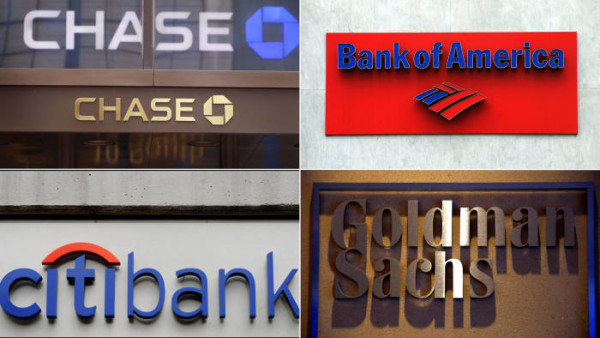Daily briefing: Payout time for US banks, Vatican finance chief charged, Hong Kong 20 years on
Simply sign up to the Global Economy myFT Digest -- delivered directly to your inbox.
Sign up to receive FirstFT by email here
It’s “payout party time” for US banks. At least that’s the view of one Stateside analyst in the wake of the Federal Reserve’s decision to clear all big US banks to pay out almost all their earnings to shareholders this year. Bourses in Asia and Europe rallied as financial stocks rose on the news. The vote of confidence in capital levels at Wall Street banks is seen as another step away from the crisis-era pressures faced by the sector not just in the US, but around the world; the FT’s Rana Foroohar warns that banks should not hand wads of cash back to investors yet.
Meanwhile, the gloss was fading on the so-called Trump trade on Thursday, with the dollar index at its lowest level since President Donald Trump’s election. Virtually every major international currency gained on the dollar in morning trade in a bout of volatility following comments from European Central Bank governor Mario Draghi on Wednesday. The jittery reaction shows that the foremost questions for global investors are when and by how much western central banks pull back from their unprecedented run of ultra-low interest rates and quantitative easing. (FT, WSJ)

In the news
Xi backs ‘One Country, Two Systems’
The Chinese president has arrived in Hong Kong for a three-day visit to celebrate the 20th anniversary of the former British colony’s handover, pledging to ensure “One Country, Two Systems”. But fears that Beijing is encroaching on autonomy and freedoms are heightened by the detention of pro-democracy campaigners ahead of the visit. There’s another big anniversary this week: it is 20 years since the Southeast Asian financial crisis. Here is a revisit in charts. (CNN, FT)
Merkel challenges Trump
At a speech to the German parliament Angela Merkel has thrown down the gauntlet to Donald Trump and pledged to fight at next week’s G20 summit for free trade, international co-operation and the Paris climate change accord. Her fighting talk shows that the summit may struggle to reach consensus on a range of issues.
Vatican finance chief charged
One of Pope Francis’s most senior advisers, Cardinal George Pell, has been charged with multiple sex offences by Australian police. The 76-year-old has taken a leave of absence to return to Australia from Rome, where he had been tasked by the Pope with cleaning up the Vatican’s finances. (FT)

Bonds to save the world
The World Bank has launched the first pandemic bond, giving investors the chance to save the world while earning a juicy return. It raised $322m in two separate three-year issues on Wednesday and also issued more than $100m of swaps offering pandemic protection. The bonds will pay investors a regular coupon, in exchange for which they lose some income or capital if a catastrophic infectious disease takes hold. (FT)
Hoax or power grab?
Venezuelans are questioning whether Tuesday night’s helicopter attack on the supreme court and interior ministry was staged by the government to give it cover for a crackdown on the opposition. (NYT)
Japanese bank’s $1tn in dollar exposure
Net holdings of dollar assets at Japanese banks have been growing before the 2008 financial crisis, and have doubled to about $1tn. They are pursuing a dangerous strategy of loading up on foreign assets with money borrowed from overseas. (NAR)
The day ahead
Nato meeting
Defence ministers gather in Brussels to discuss military spending — a hot topic after a summit last month at which Donald Trump berated allies for their “chronic underfunding”. On Wednesday, the alliance said European members and Canada would boost spending by $12bn this year. (FT)
Moon meets Trump
Moon Jae-in, the new South Korean president, is due to meet Donald Trump. Here’s Gideon Rachman on how Mr Trump’s “America First” policies could leave Seoul at risk when it comes to North Korea’s missile threat. (FT)
What we’re reading
Hong Kong’s identity crisis
Twenty years after the handover, many younger residents no longer feel Chinese. These charts show how much divisions have deepened with the mainland. (FT)

The weird world of remote PAs
They are typically young and female and organise professional lives from afar. But do the advances in technology mean that the rise of the remote personal assistant is over before it begins? (FT)
The Sistine Chapel of corporate catastrophes
Toshiba’s financial crisis is so big you have to lie on your back to appreciate its scale and mesmerising beauty — much like in a certain church in Rome, says the FT’s Leo Lewis. (WSJ)
Is the world becoming more unstable?
Despite a pushback against populism in some European countries, the world is less stable than it has been for decades. Creeping violence in Asia and conflict in the Middle East are compounded by a lack of leadership — especially in the US. Stephen M Walt asks whether we all heading for chaos. (Foreign Policy)
Japan’s bomb shelter boom
Pyongyang’s increasingly frequent missile tests are causing nervousness in Japan, with a recent opinion poll showing that 90 per cent of the population is worried about North Korea. But rather than wait for the government to act, people are taking their own protective measures: orders for underground shelters have skyrocketed. (Al Jazeera)
Video of the day
Martin Wolf on the rise of populism
Chief economics commentator Martin Wolf explores with comment editor Jonathan Derbyshire the causes of populism today, cultural and economic, and they also discuss why populism has become more potent nearly a decade after the financial crisis. (FT)
Comments